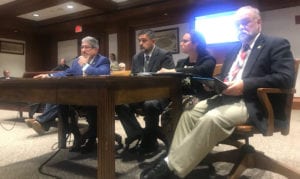Who is a member?
Our members are the local governments of Massachusetts and their elected and appointed leadership.

Fitchburg Mayor Stephen DiNatale, Fitchburg Public Works Commissioner Nicolas Bosonetto, MMA Legislative Analyst Ariela Lovett and Ludlow Public Works Director and Sturbridge Selectman Michael Suprenant testify at the Oct. 8 hearing of the Joint Committee on Transportation.
Testifying at an Oct. 8 hearing of the Joint Committee on Transportation focused on the Gov. Baker’s multiyear $18 billion transportation bond bill, the MMA repeated its request for a multiyear bond authorization for the Chapter 90 local roads program of at least $300 million per year, with an annual increase to offset inflation.
The MMA panel, which included Fitchburg Mayor Stephen DiNatale, Fitchburg Public Works Commissioner Nicolas Bosonetto, and Ludlow Public Works Director and Sturbridge Selectman Michael Suprenant, advocated for a new method of indexing Chapter 90 increases to align with annual percentage increases in the state’s Capital Investment Plan budget.
Base Chapter 90 funding has remained flat at $200 million per year since fiscal 2012. The program was supplemented in fiscal 2015, when the governor released $100 million in withheld authorizations and allocated $30 million to a Winter Recovery Program, and last year, with a one-time addition of $40 million from the state surplus. [The Legislature is now considering another $60 million appropriation in a fiscal 2019 supplemental budget bill.]
An MMA analysis found that the purchasing power of Chapter 90 funding has dropped by 25.4% over the past eight years, to an inflation-adjusted $149 million in fiscal 2020. The Massachusetts Department of Transportation’s Capital Investment Plan budget grew by 16.8% between fiscal 2017 and 2019, from $816 million to $953 million, but the Chapter 90 proportion of that budget decreased from 24.5% to 21%.
DiNatale and Bosonetto discussed the challenge of executing Fitchburg’s pavement management plan with an insufficient Chapter 90 allotment. In fiscal 2019, Fitchburg received $1.12 million in Chapter 90 funds, but the city needed an estimated $9 million to maintain its roads and bridges in a state of good repair.
A statewide analysis by the MMA in 2018 documented that cities and towns need a total of $685 million per year to get 30,000 miles of local roads and more than 2,500 local bridges up to a state of good repair, a best practice standard for maintaining capital assets. Many Massachusetts municipalities report that they must use local property tax revenue to supplement their Chapter 90 allotment, which is a hardship for large and small communities alike.
Suprenant, representing two smaller and more rural communities, expressed frustration with the level-funding of the Chapter 90 program in a multibillion dollar transportation bond bill, which the governor filed on July 25. He said state leaders are failing to recognize the importance of Chapter 90 to local public works and highway departments.
DiNatale and Bosonetto reiterated the importance of receiving authorization to spend Chapter 90 funds in a timely manner, so that the construction season can start on time.
The MMA expressed appreciation for the administration’s commitment to authorizing more funding for discrete municipal transportation grant programs, including Complete Streets, Small Bridges, and a new Municipal Pavement Program. The governor’s bond bill includes a total of $190 million for these three programs.
The MMA reiterated, however, that grant programs should not supplant basic state aid, as Chapter 90 represents the only source of unrestricted, non-competitive funds for local road and bridge maintenance and repair. The MMA stressed the need for a predictable, reliable and adequate Chapter 90 base funding level, so communities can do effective capital planning.
The transportation bond bill is still with the Joint Committee on Transportation. Once it is reported out, it will go to the House Committee on Bonding, Capital Expenditures and State Assets for a hearing.